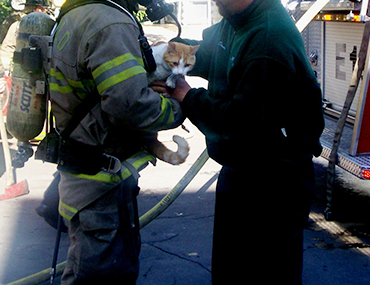
July 15th is National Pet Fire Safety Day. According to the American Fire Administration, house fires affect approximately 500,000 pets each year. Make sure you know how you can keep your pets safe from fire dangers.
Prevent Fires
The first step is to make sure your pet does not start a fire. Pets are drawn to flickering candles like moths to a flame. Besides the risk of being burned, your pet can start a house fire if they accidentally knock the candle over. Never leave lit candles unattended, especially if they are within reach of your pet. Also be careful with halogen lamps and space heaters that can start a fire if knocked over by a wagging tail or a curious cat. Finally, be mindful of dangling electrical cords that can strangle your pet or electrocute them if chewed upon. Chewed and damaged cords should be replaced immediately since they can be a fire hazard.
Be Prepared
1. Be sure you have plenty of smoke detectors and carbon monoxide detectors in your home.
2. Check your smoke and carbon dioxide detectors regularly and change their batteries at least twice a year.
3. Invest in monitored smoke detectors. Since pets are often home alone during the day, the best way to protect them, if a fire develops while you’re away, is by having smoke detectors that are connected to a monitoring center that will notify the fire department if a fire develops.
4. Post stickers on your door and windows to alert fire fighters that there are pets in the household. These stickers tell how many and what kind of animals live in your home. If you are not home during a fire, these stickers could save your pets’ lives.
5. Make sure all of your pets wear a collar with identification tags and have a microchip implanted. Taking these precautions can avoid the heartache of a lost pet during these times of chaos.
6. Create an evacuation plan for your family and pets. Make sure everyone in your family knows the escape routes.
7. Keep leashes, pet carriers and treats by an exit. You will need these to help evacuate your pets during a fire.
Unfortunately, no matter how hard we try, we can’t prevent or predict every emergency, but what we can do is to be prepared. Being prepared is the best way you can improve your chances for a safe outcome.
If you have any questions or concerns, you should always visit or call your veterinarian – they are your best resource to ensure the health and well-being of your pets.
